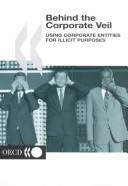| Listing 1 - 10 of 177 | << page >> |
Sort by
|
Book
ISBN: 9052015015 Year: 1995 Volume: 1 Publisher: Brussels [Bruges] European Interuniversity Press College of Europe = Collège d'Europe
Abstract | Keywords | Export | Availability | Bookmark
 Loading...
Loading...Choose an application
- Reference Manager
- EndNote
- RefWorks (Direct export to RefWorks)
Financial law --- Switzerland --- Banken --- Banques --- Communautés européennes --- Europese Gemeenschappen --- Geld --- Monnaies --- Suisse --- Zwitserland --- AA / International- internationaal --- CH / Switzerland - Zwitserland - Suisse --- 343.35 --- Misdrijven tegen de openbare administratie, de belasting- en administratieve wetgeving. --- Misdrijven tegen de openbare administratie, de belasting- en administratieve wetgeving
Book
ISBN: 9060004574 Year: 1986 Publisher: Arnhem Gouda Quint
Abstract | Keywords | Export | Availability | Bookmark
 Loading...
Loading...Choose an application
- Reference Manager
- EndNote
- RefWorks (Direct export to RefWorks)
Private finance --- Italy --- IT / Italy - Italië - Italie --- 333.101 --- 343.538 --- 331.157 --- 343.35 --- 333.109 --- Banksysteem en bankstelsel. --- Bedrog in bankverrichtingen. --- Geldwezen sedert 1945. --- Misdrijven tegen de openbare administratie, de belasting- en administratieve wetgeving. --- Veiligheid. Bankovervallen. Bankrisico's. --- Banksysteem en bankstelsel --- Bedrog in bankverrichtingen --- Geldwezen sedert 1945 --- Misdrijven tegen de openbare administratie, de belasting- en administratieve wetgeving --- Veiligheid. Bankovervallen. Bankrisico's
Book
ISBN: 2246247462 Year: 1992 Publisher: Paris : Bernard Grasset,
Abstract | Keywords | Export | Availability | Bookmark
 Loading...
Loading...Choose an application
- Reference Manager
- EndNote
- RefWorks (Direct export to RefWorks)
Tax havens --- Paradis fiscaux --- AA / International- internationaal --- 336.208 --- 343.35 --- Grondslag, vereffening, inning en controle van de belastingen. Fiscale fraude. Zwartwerk. Parallelle economie. --- Misdrijven tegen de openbare administratie, de belasting- en administratieve wetgeving. --- Grondslag, vereffening, inning en controle van de belastingen. Fiscale fraude. Zwartwerk. Parallelle economie --- Misdrijven tegen de openbare administratie, de belasting- en administratieve wetgeving
Book
ISBN: 2863253530 Year: 2003 Publisher: Paris : Les Editions D'organisation / La Revue Banque Edition,
Abstract | Keywords | Export | Availability | Bookmark
 Loading...
Loading...Choose an application
- Reference Manager
- EndNote
- RefWorks (Direct export to RefWorks)
Money laundering --- Banking law --- Blanchiment de l'argent --- Banques --- Droit --- blanchiment --- fraude --- france --- AA / International- internationaal --- FR / France - Frankrijk --- 343.35 --- witwassen --- frankrijk --- Misdrijven tegen de openbare administratie, de belasting- en administratieve wetgeving. --- Misdrijven tegen de openbare administratie, de belasting- en administratieve wetgeving
Book
ISBN: 9782828908225 2828908224 Year: 2005 Publisher: Lausanne: Favre,
Abstract | Keywords | Export | Availability | Bookmark
 Loading...
Loading...Choose an application
- Reference Manager
- EndNote
- RefWorks (Direct export to RefWorks)
AA / International- internationaal --- 336.208 --- 343.35 --- Grondslag, vereffening, inning en controle van de belastingen. Fiscale fraude. Zwartwerk. Parallelle economie. --- Misdrijven tegen de openbare administratie, de belasting- en administratieve wetgeving. --- Grondslag, vereffening, inning en controle van de belastingen. Fiscale fraude. Zwartwerk. Parallelle economie --- Misdrijven tegen de openbare administratie, de belasting- en administratieve wetgeving
Book
ISBN: 2863254383 9782863254387 Year: 2005 Publisher: Paris : Revue Banque éd.,
Abstract | Keywords | Export | Availability | Bookmark
 Loading...
Loading...Choose an application
- Reference Manager
- EndNote
- RefWorks (Direct export to RefWorks)
fraude --- criminalite --- blanchiment --- marches financiers --- AA / International- internationaal --- 333.139.2 --- 343.35 --- criminaliteit --- witwassen --- financiele markten --- Bankcontrole en -reglementering. Reglementering van het bankberoep. --- Misdrijven tegen de openbare administratie, de belasting- en administratieve wetgeving. --- Bankcontrole en -reglementering. Reglementering van het bankberoep --- Misdrijven tegen de openbare administratie, de belasting- en administratieve wetgeving --- Blanchiment de l'argent
Book
ISBN: 9780801450181 9780801463204 0801463203 080146319X 9780801463198 0801450187 1322505179 Year: 2011 Publisher: Ithaca [N.Y.] : Cornell University Press,
Abstract | Keywords | Export | Availability | Bookmark
 Loading...
Loading...Choose an application
- Reference Manager
- EndNote
- RefWorks (Direct export to RefWorks)
A generation ago not a single country had laws to counter money laundering; now, more countries have standardized anti-money laundering (AML) policies than have armed forces. In The Money Laundry, J. C. Sharman investigates whether AML policy works, and why it has spread so rapidly to so many states with so little in common. Sharman asserts that there are few benefits to such policies but high costs, which fall especially heavily on poor countries. Sharman tests the effectiveness of AML laws by soliciting offers for just the kind of untraceable shell companies that are expressly forbidden by global standards. In practice these are readily available, and the author had no difficulty in buying the services of such companies. After dealing with providers in countries ranging from the Seychelles and Somalia to the United States and Britain, Sharman demonstrates that it is easier to form untraceable companies in large rich states than in small poor ones; the United States is the worst offender.Despite its ineffectiveness, AML policy has spread via three paths. The Financial Action Task Force, the key standard-setter and enforcer in this area, has successfully implemented a strategy of blacklisting to promote compliance. Publicly identified as noncompliant, targeted states suffered damage to their reputation. Subsequently, officials from poor countries became socialized within transnational policy networks. Finally, international banks began using the presence of AML policy as a proxy for general country risk. Developing states have responded by adopting this policy as a functionally useless but symbolically valuable way of reassuring powerful outsiders. Since the financial crisis of 2008, the G20 has used the successful methods of coercive policy diffusion pioneered in the AML realm as a model for other global governance initiatives.
AA / International- internationaal --- 343.35 --- 347.734 --- Misdrijven tegen de openbare administratie, de belasting- en administratieve wetgeving. --- Bank- en spaarinstellingen (recht). --- Banks and banking, International --- Money laundering --- Law and legislation. --- Prevention. --- Banking law --- Law and legislation --- Prevention --- Misdrijven tegen de openbare administratie, de belasting- en administratieve wetgeving --- Bank- en spaarinstellingen (recht) --- E-books

ISBN: 2863252607 Year: 1998 Publisher: Paris : Revue Banque,
Abstract | Keywords | Export | Availability | Bookmark
 Loading...
Loading...Choose an application
- Reference Manager
- EndNote
- RefWorks (Direct export to RefWorks)
AA / International- internationaal --- FR / France - Frankrijk --- 343.35 --- Misdrijven tegen de openbare administratie, de belasting- en administratieve wetgeving. --- Money laundering. --- Money laundering --- Laundering of money --- Money washing --- Washing of money --- Misdrijven tegen de openbare administratie, de belasting- en administratieve wetgeving --- Commercial crimes
Book
ISBN: 9781316615270 1316615278 9781107163706 9781316681596 1107163706 1316730409 1316732339 1316681599 Year: 2017 Publisher: Cambridge Cambridge University Press
Abstract | Keywords | Export | Availability | Bookmark
 Loading...
Loading...Choose an application
- Reference Manager
- EndNote
- RefWorks (Direct export to RefWorks)
Corruption is a serious threat to prosperity, democracy and human well-being, with mounting empirical evidence highlighting its detrimental effects on society. Yet defining this threat has resulted in profound disagreement, producing a multidimensional concept. Tackling this important and provocative topic, the authors provide an accessible and systematic analysis of how our understanding of corruption has evolved. They identify gaps in the research and make connections between related concepts such as clientelism, patronage, patrimonialism, particularism and state capture. A fundamental issue discussed is how the opposite of corruption should be defined. By arguing for the possibility of a universal understanding of corruption, and specifically what corruption is not, an innovative solution to this problem is presented. This book provides an accessible overview of corruption, allowing scholars and students alike to see the far reaching place it has within academic research.
Political corruption. --- Corruption. --- Corrupt practices --- Ethics --- Boss rule --- Corruption (in politics) --- Graft in politics --- Malversation --- Political scandals --- Politics, Practical --- Corruption --- Misconduct in office --- 343.35 --- Misdrijven tegen de openbare administratie, de belasting- en administratieve wetgeving. --- Public administration --- Political corruption --- Misdrijven tegen de openbare administratie, de belasting- en administratieve wetgeving

ISBN: 9264195432 9786610080472 1280080477 9264195602 Year: 2001 Publisher: Paris : OECD,
Abstract | Keywords | Export | Availability | Bookmark
 Loading...
Loading...Choose an application
- Reference Manager
- EndNote
- RefWorks (Direct export to RefWorks)
AA / International- internationaal --- 343.35 --- Misdrijven tegen de openbare administratie, de belasting- en administratieve wetgeving. --- Commercial crimes --- Corporations --- Corporate bribery --- Corporate corruption --- Corporate crime --- Business ethics --- Crimes, Financial --- Financial crimes --- Offenses affecting the public trade --- Crime --- Corrupt practices --- Misdrijven tegen de openbare administratie, de belasting- en administratieve wetgeving --- Commercial crimes. --- Corrupt practices. --- Infractions économiques --- Entreprises --- Pratiques déloyales
| Listing 1 - 10 of 177 | << page >> |
Sort by
|

 Search
Search Feedback
Feedback About UniCat
About UniCat  Help
Help News
News